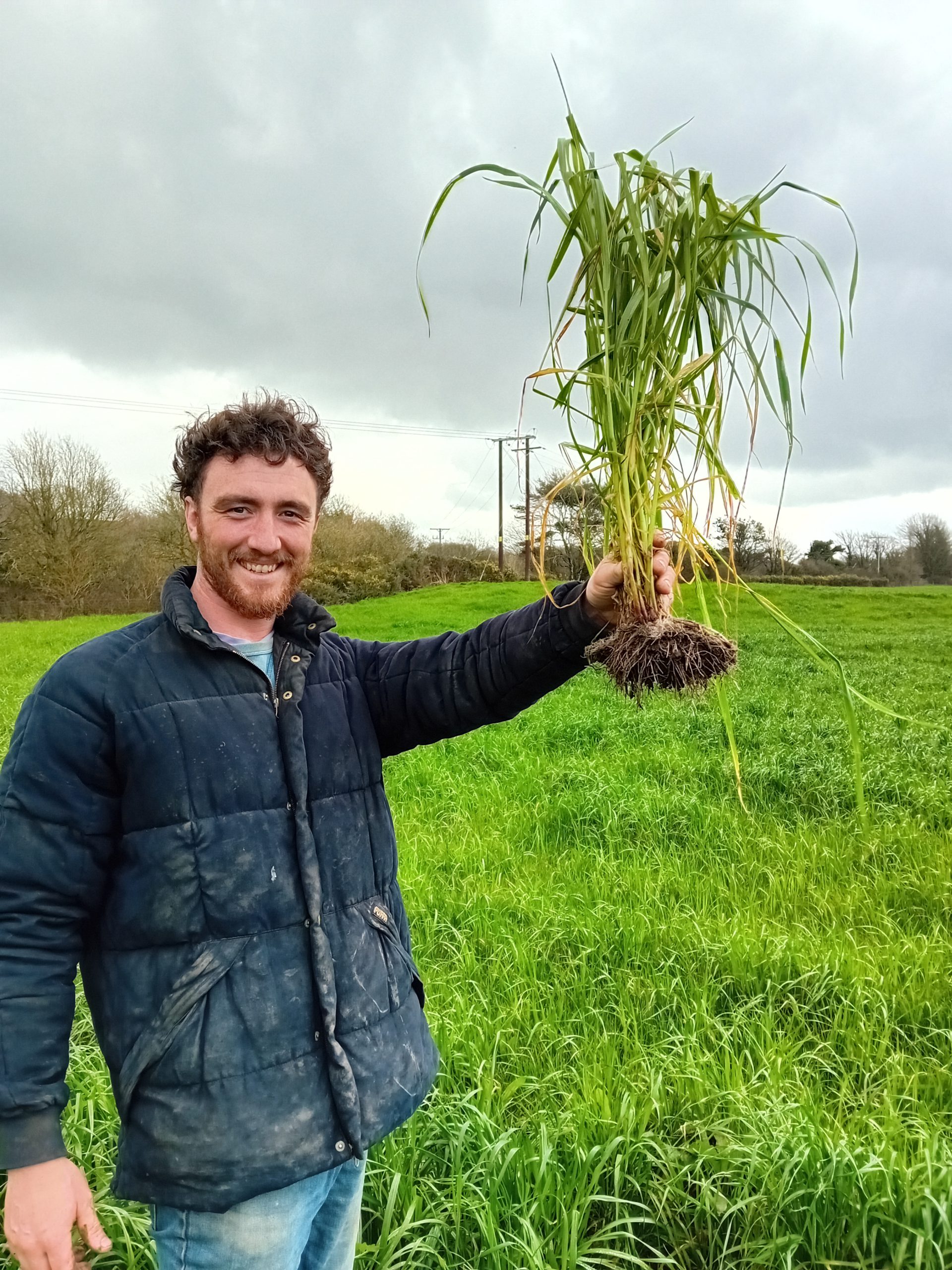
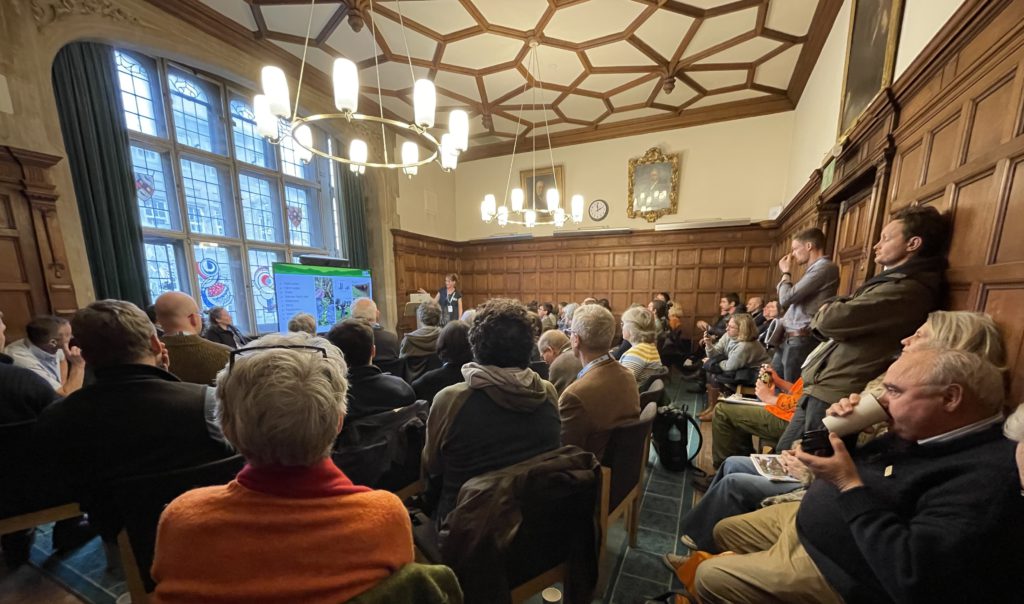
Welcome to our April Farm Net Zero newsletter, sharing updates for our farmers, growers and the wider community this project supports.
(Image above: Dr Hannah Jones/FCT presenting at the ORFC)
Recent news and events
Oxford Real Farming Conference: January 2024
An intrepid band of Farm Net Zero farmers and project staff made their way to Oxford for the Real Farming Conference where we were presenting a session called “It Takes a Farm Community to be Net Zero: A Case Study from Cornwall”. This was a sell-out, with people queuing to get in, and helped to demonstrate the excellent work the FNZ farmers are doing as part of their communities. The film we produced was well-received, even earning a “whoop” from the crowd! It is available to watch here: https://farmcarbontoolkit.org.uk/2024/01/18/five-farms-in-cornwall/.
As well as the impressive range of sessions we were able to attend (covering everything from the role of vets in ecological sustainability to farm succession planning), we watched the premiere of “Six Inches of Soil” – a new film about farming starring Farm Net Zero monitor farmer Ben Thomas and featuring Farm Net Zero’s own Hannah Jones.
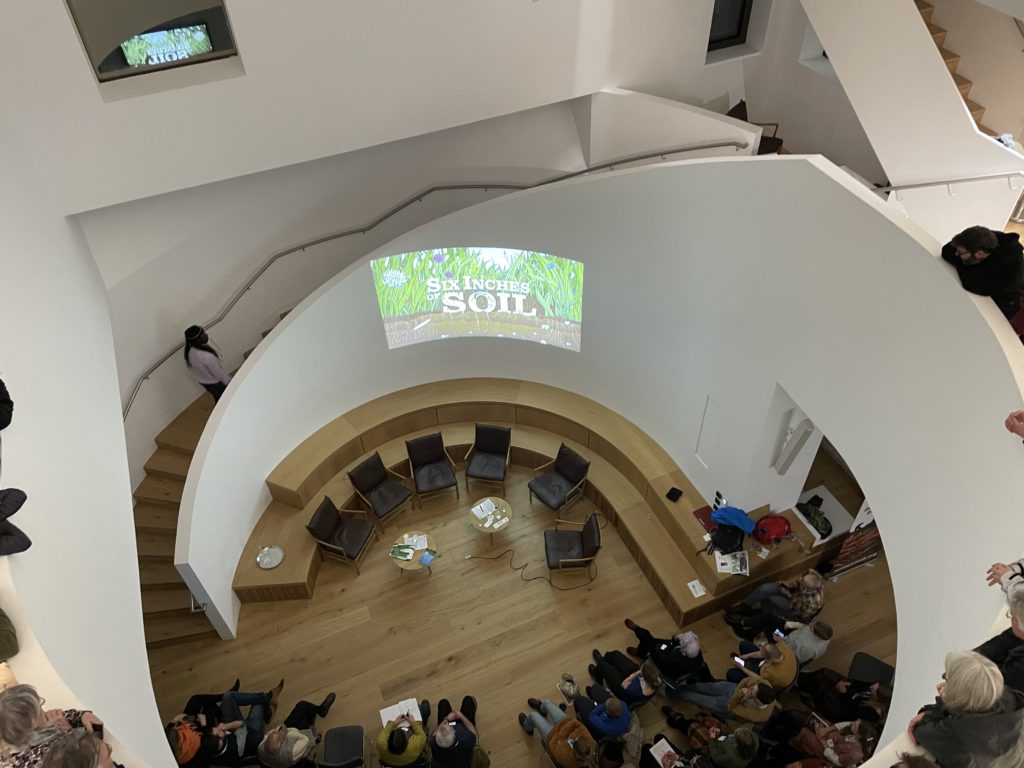
Community film screening 25th March
On Monday 25th March, we showed the Farm Net Zero Community Film at Stoke Climsland Parish Hall. This event was very well attended by members of the local community, drummed up by Bonny Lightfoot and Martin Howlett, FNZ monitor farmers and stars of the film. Following the screening, there was a panel session with the farmers where attendees were able to ask questions on climate change, biodiversity and how the project farmers are working together to address these issues.
We ended the session with the farmers’ visions of farming in the future, with all agreeing that there will be more of a mix and integration between farming and nature.
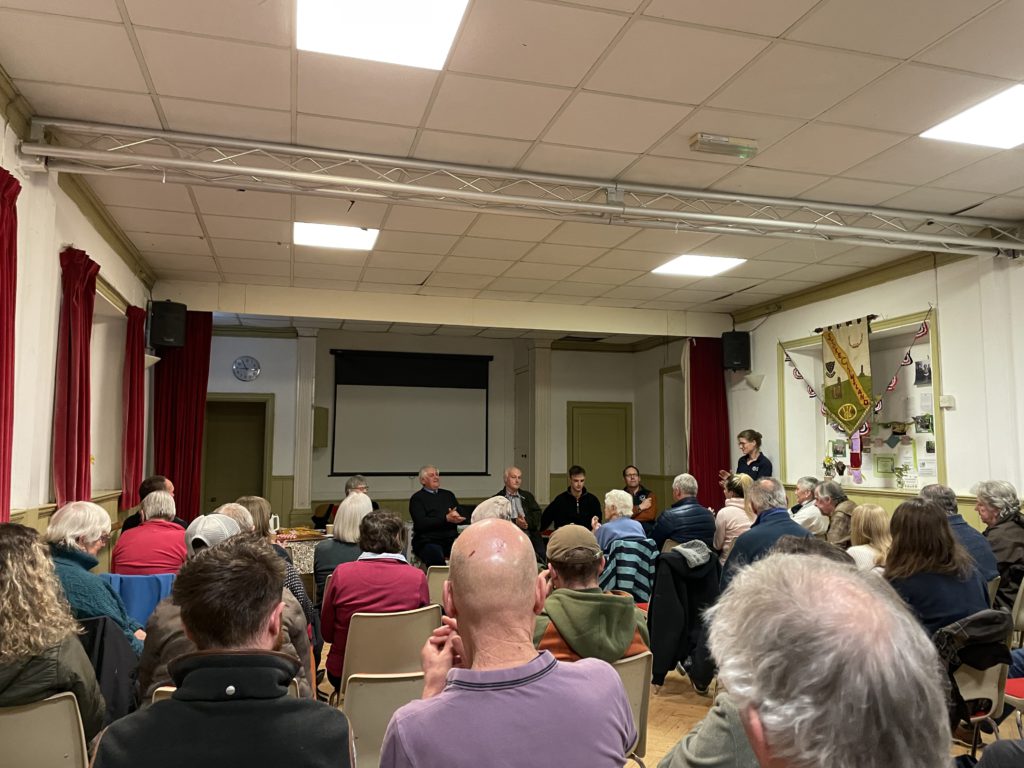
“Filming on Your Phone” Workshop
We ran our second “Filming on Your Phone” workshop with Down to Earth Media just before Christmas. This gave a group of farmers the opportunity to learn about how to share their stories and the good work they are doing. Since the start of the project, 12 farmers have now received media training.
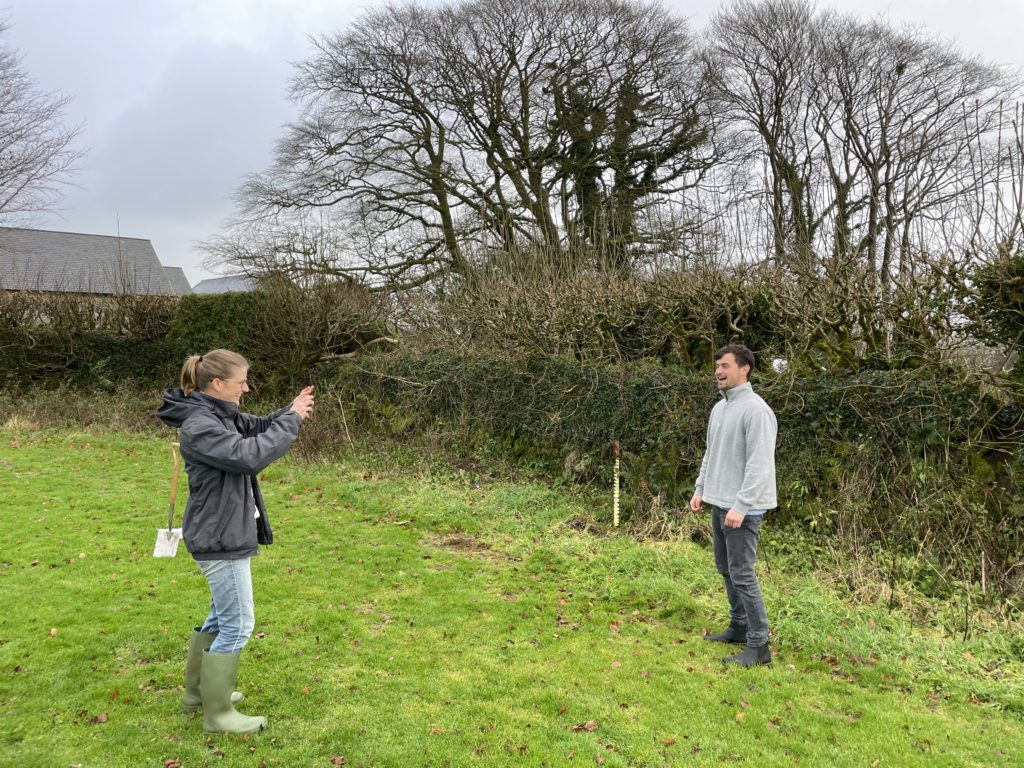
Summaries of all these events, and many more, are available on the Farm Net Zero Project Resources webpage.
Agri-Carbon Kernow
The success of Farm Net Zero has led to a short project funded through Cornwall Council’s Shared Prosperity Fund, to work with farms in Cornwall on carbon, biodiversity and water management plans. This project is a collaboration between the Rural Business School, Farm Carbon Toolkit, Westcountry Rivers Trust and Cornwall Wildlife Trust. If you are a farmer interested in taking part, please contact [email protected]
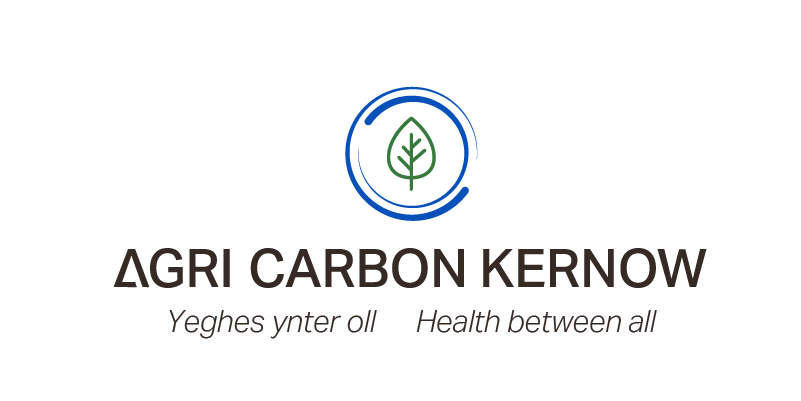
Falmouth Climate Change event
The Farm Net Zero team was present at the Climate Change Exhibition held at the Polytechnic (“the Poly”) in Falmouth on March 8th and 9th. The event, which was organised by Falmouth Rotary Club, was aimed at raising awareness amongst the general public. We were able to share some of our great work with passers-by, and as a result of our presence at the event, we have been asked to host a visit by two Cornish MPs this Spring.
Demo farm and field lab update
Inter-cropping cabbage
The inter-crop sampling for the cabbages has just been completed at Ennis Barton, one of our FNZ demo farms. This is a collaboration between Andrew Brewer and Andy Williams of Riviera Produce Ltd. Soil samples have been sent away for assessment of soil organic matter, but it is the impact on soil aggregate stability, and water infiltration that is of particular interest in this short term winter cover crop. A mix of buckwheat , phacelia, white clover, plantain and chicory was broadcast between cabbages in 4 blocks across 4 fields and compared to the control treatment of no cover crop. More data to follow.
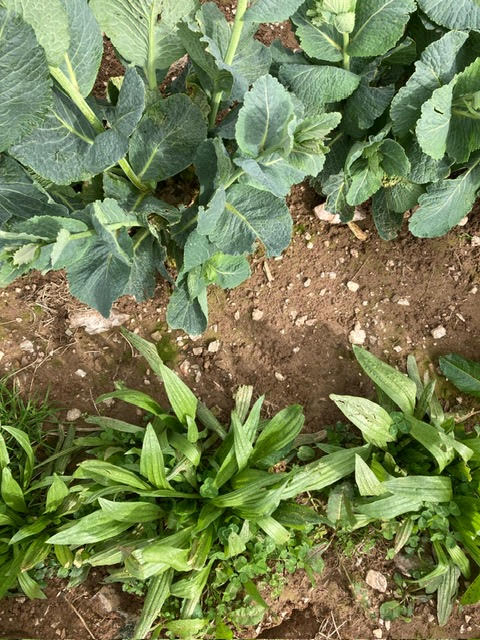
Farm Net Zero maize trials
This is the second year of the FNZ – Innovative Farmers maize field lab. This trial is evaluating the effects of different establishment methods, such as strip till and under sowing, on maize yield and soil health. For example, at Duchy College the trial plans involve splitting a maize field between conventional establishment and reduced cultivation and then trialling undersown mixtures in the opposite direction across the field.
This year we have teamed up with Plymouth University who will be carrying out some more in-depth soil testing. If you’re interested in taking part in the trials please do get in touch: [email protected].
We have a meeting planned for the triallists and researchers on 3rd April near Bodmin.
More information on last year’s trial can be found here: https://www.innovativefarmers.org/field-labs/fnz-maize-field-lab/
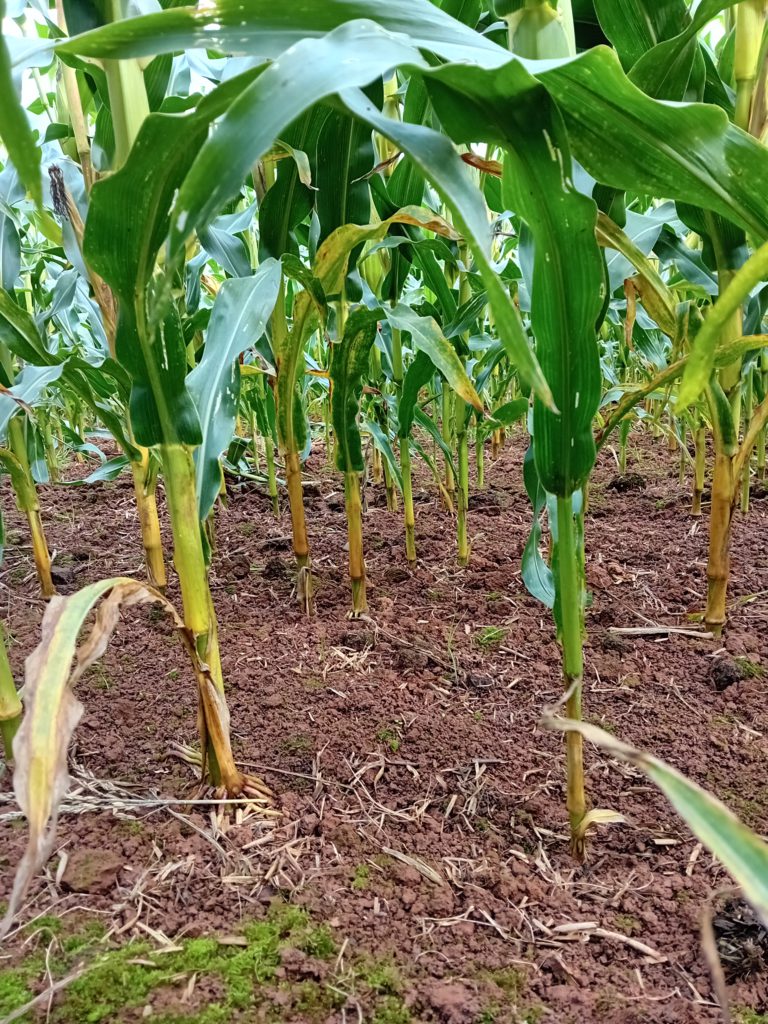
Diverse covers and leys to reduce worm burden at weaning
Weaning shock in lambs can cause physiological stress and slow growth rates. But this effect could be offset by enhanced forage protein content.
Two of our monitor farmers, Matt Smith and Anthony Ellis, have teamed up with the Farm Carbon Toolkit to launch a new Farm Net Zero trial, examining the effect of protein rich cover crops on lamb growth rates. This Innovative Farmers field lab will test a bespoke chicory-rich mixture for lamb weaning. The farmers hope it will improve growth rates, reduce lamb production footprint, improve soil health and lamb welfare, as well as reduce the need for wormers.
For more information see the field lab page on the Innovative Farmers website: https://www.innovativefarmers.org/field-labs/diverse-covers-and-leys-to-reduce-worm-burden-at-weaning/
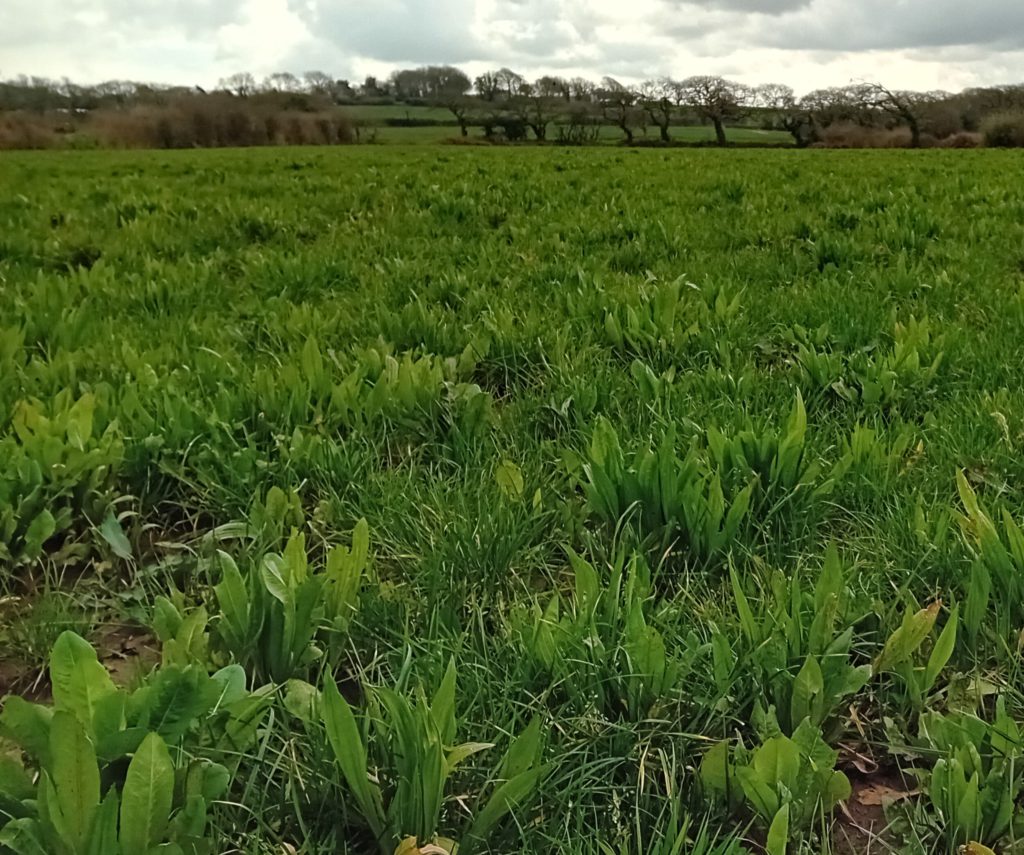
Farm Net Zero field lab – herbal leys for dairy
This spring sees the launch of the Farm Net Zero and Innovative Farmers dairy field lab. In this trial Andrew Brewer, Farm Net Zero monitor farmer, will be exploring the question of whether different pasture species impact milk yield and constituents.
Andrew will split his dairy herd, grazing one group on standard ryegrass and clover leys, and the other on diverse swards/ herbal leys. Forage samples will be taken ahead of the cows moving in to graze. The milk yield and constituents from the trial cows will then be measured regularly throughout the 2024 growing season.
The project is being carried out in collaboration with the University of Bristol
and Cornwall Wildlife Trust and will deal with the big question many dairy farmers want answered. Dr Daniel Enriquez Hidalgo of University of Bristol, has been leading the study design and will be carrying out the results analysis. We are grateful to Andrew for all the extra hard work the trial will involve.
For more information on the field lab, see the Innovative Farmers website page: https://www.innovativefarmers.org/field-labs/fnz-herbal-leys-and-dairy/#
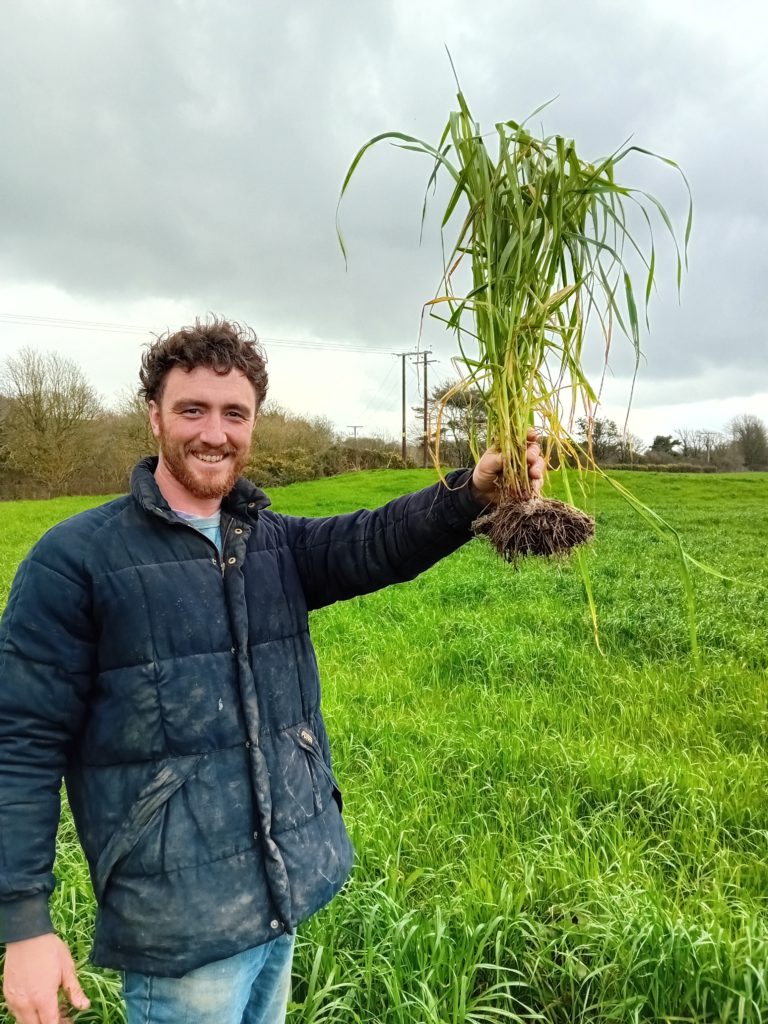
Dock Control Field Lab
Last years ‘How to rejuvenate pastures’ hosted by James Barrett has led to a new field lab. James rotaseeded a dock-infested grassland and destroyed docks just by addressing surface compaction.
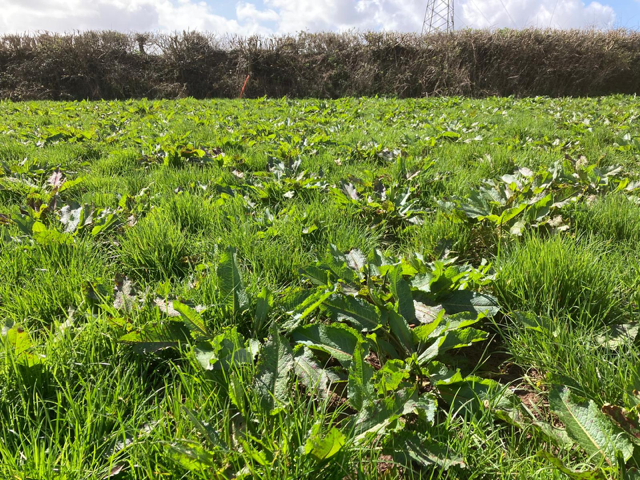
Calcium levels were also found to be at good levels in the soil. The new field lab will be recruiting up to 10 farmers, a field each, to test out the impact of optimising soil structure through mechanical intervention and the use of granular and foliar calcium application. Please contact a member of the FNZ team if you would like to be involved.
What next?
Workshop “Gardening & Trees” – with FNZ & Nourish Kernow,
Sunday April 21st, 1:30pm – 4pm, Higher Culloden Farm, College Road, Camelford, PL32 9TL
As part of our community engagement activities, Westcountry Rivers Trust’s Farm Net Zero team are joining Nourish Kernow for the project’s next climate-friendly gardening workshop.
Learn about the environmental benefits of planting trees, shrubs, and perennial plants alongside food crops. The event will include a hands-on soil health assessment that you can try at home, plus ideas to help you manage your garden to best sequester carbon and adapt to a changing climate, as well as boosting biodiversity.
We will be taking a look at the trees recently planted at the farm to support its habitat management plan and hearing about the inspiration and challenges behind the farm’s wider Community Supported Agriculture project to create a regenerative market garden on the edge of town.
Have fun as you learn about the environmental benefits of planting trees, shrubs, and perennial plants alongside food crops at home.
Book here
Farm Net Zero farm events
We will be continuing to run a series of Farm Net Zero events in 2024, drawing on the needs and interests from the community of farmers. These will be advertised on our website and through this newsletter. If you have any suggestions for events we could run, please let us know.
You’ll find a full range of relevant events on our website.
Click here to view our full events page
Getting in touch
As ever, if you have any questions or ideas that would further support the community of farmers that we are working with, please get in touch with the project team (contact details below).
All information about the project including upcoming events and resources are available on the Farm Net Zero website. If there is anything you would like to see featured please let us know.
This project, funded by the National Lottery Community Fund, is a partnership between Cornwall College, The Farm Carbon Toolkit, Duchy College’s Rural Business School, Westcountry Rivers Trust, Innovative Farmers and Innovation for Agriculture.


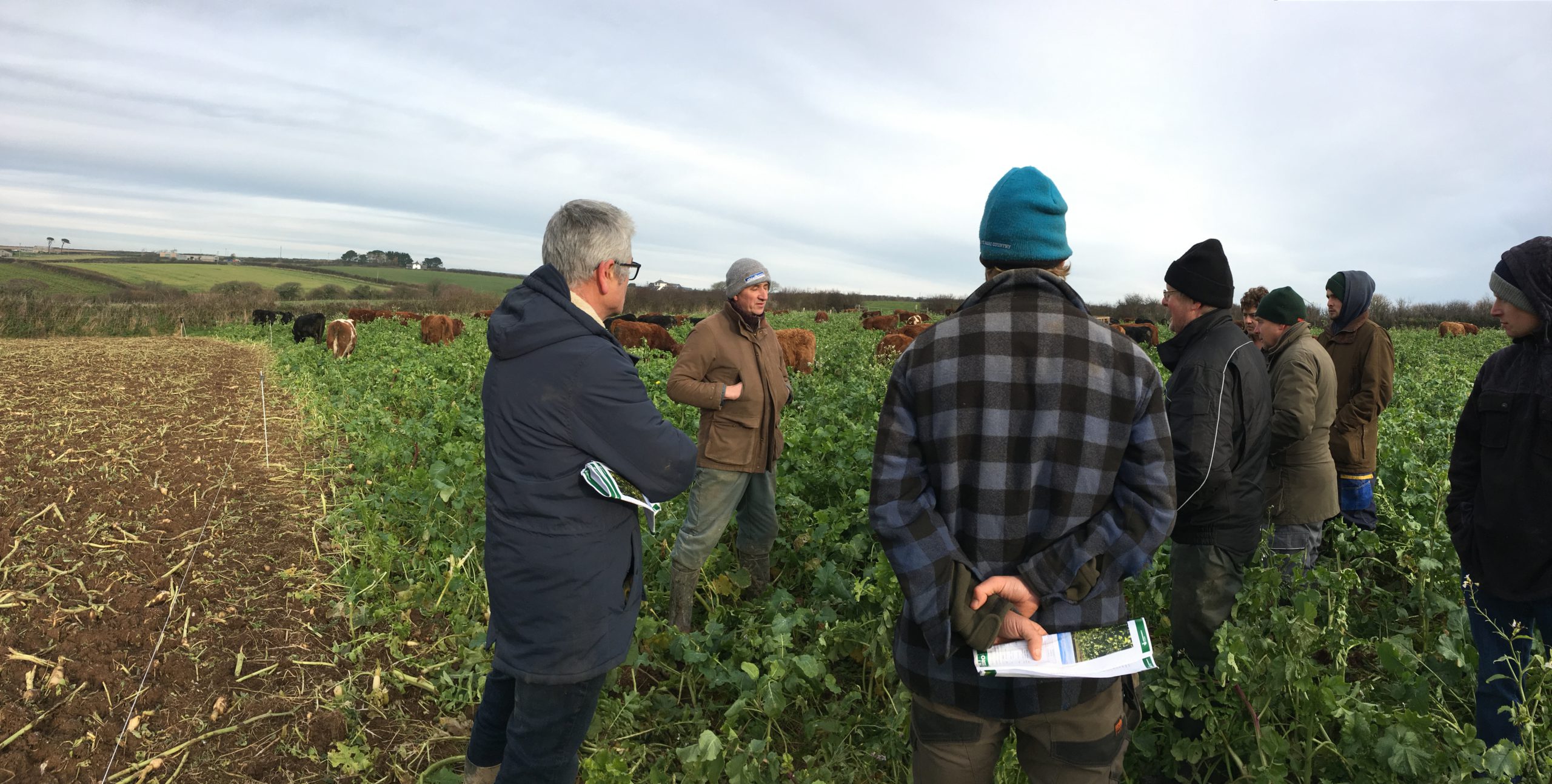
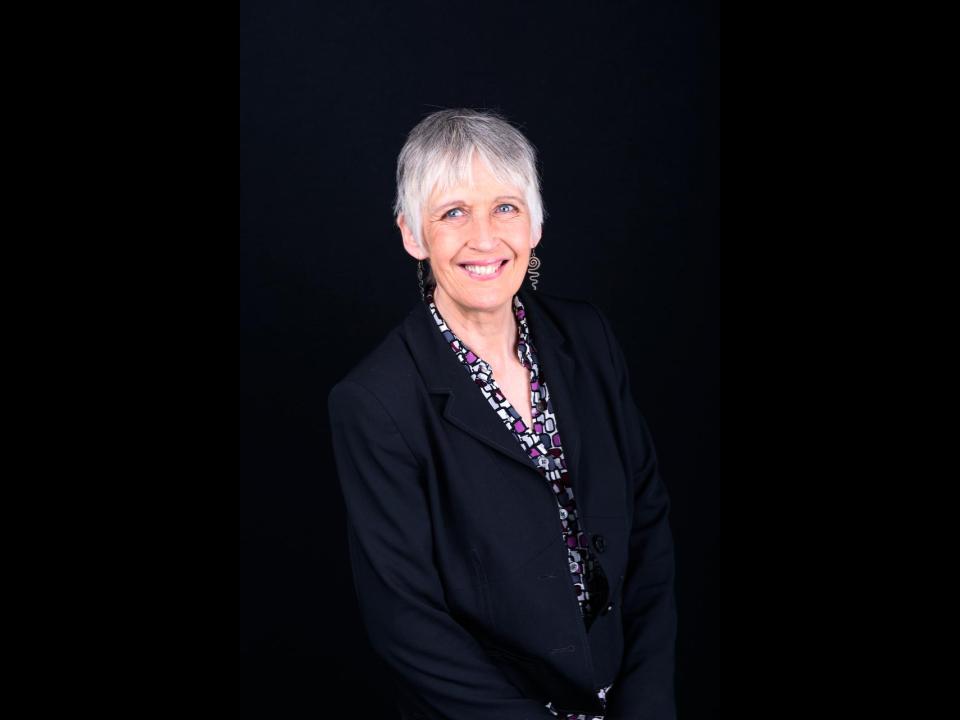
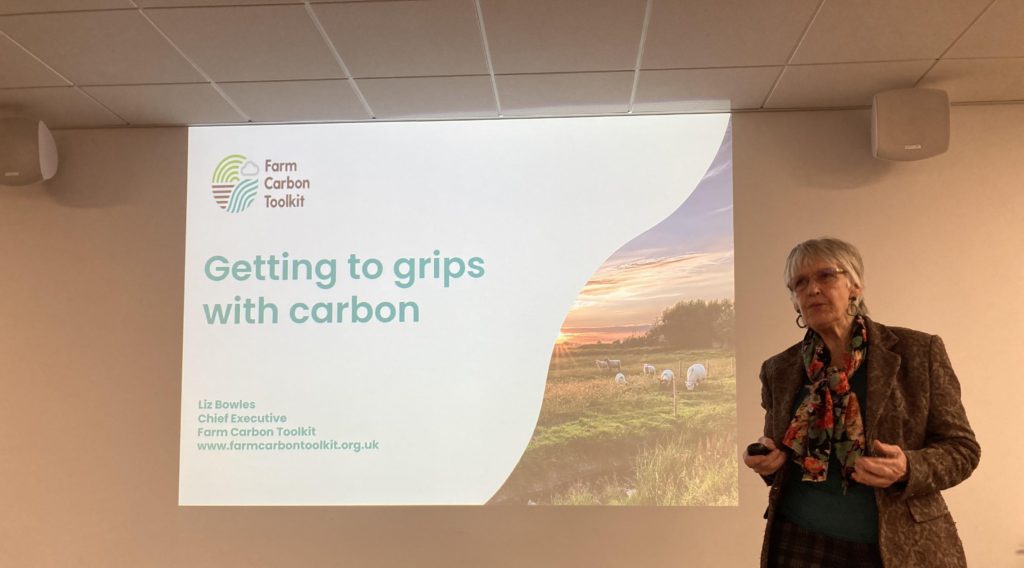
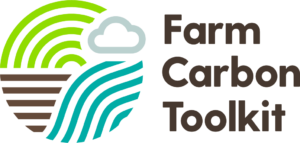
Recent Comments